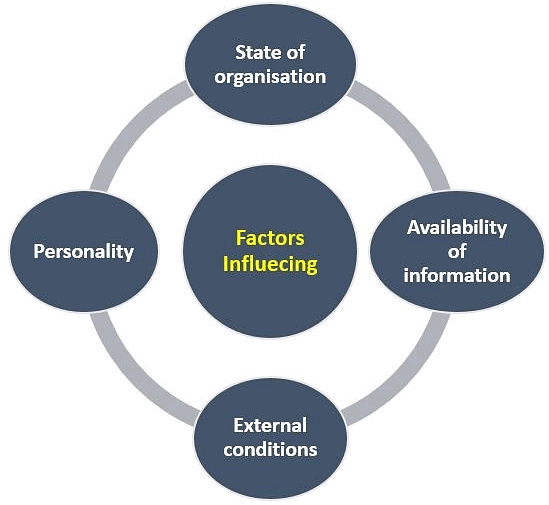Factors influencing decision-making and Judgment | Psychology for UPSC Optional (Notes) PDF Download
Introduction
Decision-making involves selecting a valid option based on the presented problem. It is a cognitive process that includes imagination (considering consequences), reasoning (providing a rationale for the chosen alternative), evaluation (assessing consequences and selecting the best option), and judgment. The decision-maker determines the most appropriate course of action to achieve a goal. It is a goal-oriented and continuous process, characterized by a systematic and interactive approach. Decision-making is contextual, influenced by factors such as location, situation, and time. Communicating the results and involving participation can enhance its effectiveness.
Factors Influencing Decision-Making
Numerous factors can influence decision-making. Atmosudirjo identified two significant factors: organizational nature and personal capabilities of the decision-maker. Organizational factors include the environment, work culture, and adaptability to goals. Personal factors encompass individual characteristics like gender, age, experience, cognitive biases, and belief in personal relevance. Personal factors are often challenging to control or predict due to their complexity.
Arroba outlined five factors related to the decision-maker that affect decision-making:
- Information: The level of knowledge about the problem is crucial. Insufficient information can lead to erroneous decisions. Considering the pros and cons of available solutions is essential.
- Educational Level: Well-educated decision-makers can understand the potential consequences of their choices. Being aware of the impact of decisions is crucial.
- Personality: According to the Big Five Factor Model, effective decision-makers exhibit low extraversion and agreeableness, low neuroticism, and high openness to experience and conscientiousness. They need emotional control and rational decision-making, while considering emotions and having a broader perspective. Being organized and disciplined is important.
- Coping: Good decision-makers can handle new situations and adapt. Novel situations can be stressful and impact decision-making. Being prepared to tackle problems is necessary.
- Culture: Cultural factors influence decision-making. Cultural upbringing shapes individuals' perspectives. Western cultures often emphasize individualistic approaches, while Asian cultures tend to prioritize collectivism. Cultural differences can lead to varying conclusions when faced with the same problem. Both decisions can be justified within their cultural context.
Individual factors such as personality and culture primarily relate to the psychological aspects of an individual, while organizational factors like the level of education pertain to the organization itself. Organizational factors are complex and influenced by multiple determinants, unlike individual factors.
Another researcher, Syamsi, identified four factors that influence the decision-making process:
- Organizational state: This refers to whether the organization is a high-level institute or a small company.
- Availability of information: Sufficient information about the problem and its consequences is crucial.
- External conditions or environment: This factor considers the level of support from the environment or individuals in higher positions than the decision-maker.
- Personality and skill of the decision-maker: The decision-maker's personal traits and competencies play a significant role.

The first three factors fall under the organizational category, influencing the decision-making process. The dynamics of an organization are also considered an important factor in influencing decision-making.
Conclusion
Decision-making is a skill that involves selecting the best alternative to solve a problem. It encompasses various cognitive processes, but like any other process, it can be influenced by multiple factors. Researchers have explored factors such as personality, culture, context, available information, and level of education that can impact decision-making. While some of these factors can be controlled, others, like personality or culture, cannot. Nonetheless, it is important to cultivate decision-making skills from an early stage, such as in educational settings.
|
160 videos|215 docs
|




















